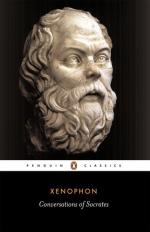
|
| Name: _________________________ | Period: ___________________ |
This test consists of 15 multiple choice questions and 5 short answer questions.
Multiple Choice Questions
1. What is the main theme of the Memoirs?
(a) God does not exist.
(b) Socrates is always correct.
(c) Its not what you know; it's who you know.
(d) The ideal of the true good.
2. What does Critobulus worry about good men?
(a) They often quarrel and treat each other poorly.
(b) They are only good due to wealth.
(c) They have malicious intentions.
(d) They are deceiving the world.
3. According to Socrates, why was he not introducing new deities?
(a) He had a prophetic dream.
(b) He refused to give a reason.
(c) He had heard of the new deities from foreigners.
(d) One of the gods had spoken to him.
4. What did Socrates not encourage his students to do?
(a) Become tyrants.
(b) Read other teachings besides his.
(c) Pay taxes.
(d) Join the military.
5. What does Socrates argue no one has done because of him?
(a) Stopped worshiping the gods.
(b) Deserted the army.
(c) Committed treason.
(d) Died.
6. How did Critias and Alcibiades do great damage to Athens?
(a) As oligarchs.
(b) Releasing animals from their cages.
(c) Committing treason.
(d) They started a fire.
7. At the start of subsection 3, whom does Socrates advise according to Xenophon?
(a) The Oracle of Delphi.
(b) Two brothers, Chaerephon and Chaerecrates.
(c) Plato.
(d) His nieces and nephews.
8. What does Socrates praise in a homily to show that he loved virtue?
(a) Money and power.
(b) The sunshine.
(c) The value of self-discipline.
(d) The Greek government.
9. How does Xenophon end his discussion in subsection 10?
(a) By questioning his own authority.
(b) By recounting a discussion between Socrates and Diodorus.
(c) By allowing Socrates to leave.
(d) By condemning Socrates as a heretic.
10. When in his life is Xenophon reported to have written the memoirs?
(a) Xenophon reportedly wrote them as a young man.
(b) The memoirs are supposedly written posthumously.
(c) Xenophon did not do the writings himself.
(d) It is believed Xenophon wrote them late in his life.
11. What are the standards of virtue as seen by Socrates?
(a) Wealth and slave owning.
(b) Wisdom, justice, self-control, and piety.
(c) Patience is the only virtue according to Socrates.
(d) Time management and athletic ability.
12. What does the editor emphasize should not prevent you from using worldly goods?
(a) The thoughts of other people.
(b) The government.
(c) The amount of money you have.
(d) The virtue of self-discipline.
13. What does Xenophon argue that Socrates has never done?
(a) Obeyed laws.
(b) Sacrificed to the gods.
(c) Listened to others.
(d) Uttered a heretical word.
14. How does Plato compare to Xenophon as a philosopher?
(a) Plato is inferior to Xenophon.
(b) Plato is a better philosopher.
(c) They are about equal.
(d) They are too similar to compare.
15. In the second subsection of Book 1, what does Xenophon deny Socrates has done?
(a) Bribed him for protection.
(b) Met the Oracle of Delphi.
(c) Had a negative effect on the youth.
(d) Spoke to the gods.
Short Answer Questions
1. What is the general point of Book 2?
2. Who brought the charges against Socrates?
3. What does Xenophon argue Socrates could not lead people to do?
4. What does Xenophon argue the city of Athens should do to Socrates?
5. What is Xenophon confused by in the first subsection of Book 1?
|
This section contains 594 words (approx. 2 pages at 300 words per page) |

|




